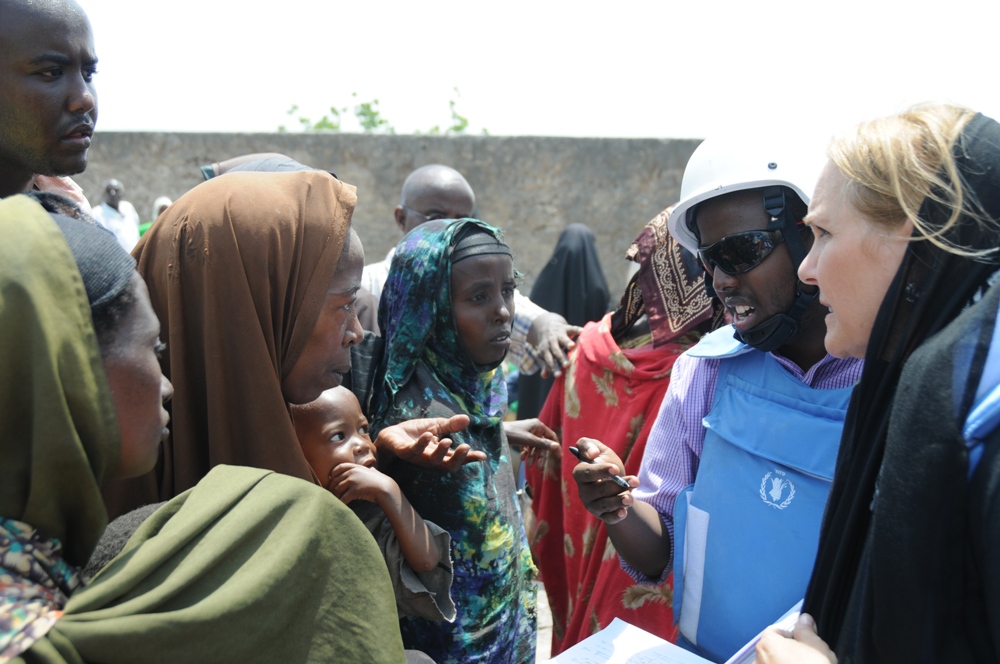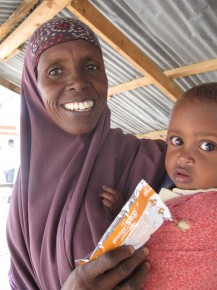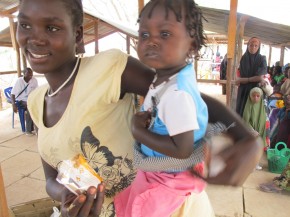
One of the tragedies of our time is the prevalence of malnutrition. Maternal and child undernutrition is the underlying cause of 3.5 million deaths in children under five each year.
For those who manage to survive, nearly 200 million children are stunted - that means they are short for their age, more likely to suffer from disease and their intellectual development is affected. Another 130 million children are underweight. And the effects this all has get passed on to their own children.
According to the Journal of the American Medical Association, children of mothers who were stunted are at a higher risk of dying within the first five years of life. The 2008 landmark Lancet series found that inadequate nutrition during the first 1000 days - from conception to two years old - leads to irreversible damage in physical and brain development.
The greater tragedy is that we live in a time when we have the knowledge and tools to prevent this loss.
If any good comes out of the current famine in the Horn of Africa - amidst the pictures of mothers carrying dying babies at their shrivelled breasts and hollow-eyed children with swollen bellies and matchstick limbs - it will be galvanising the world on the need to ensure access to nutritious food for the world’s most vulnerable people.
None of us have been left unmoved by the shocking images of malnutrition coming out of the Horn of Africa. I had a chance to see first-hand the drought-ravaged areas during my recent visit to Somalia with Australian Foreign Minister Kevin Rudd, who has rightly called this crisis the "children’s famine". They are the ones already so vulnerable, often too young and weakened by malnutrition to survive. At one of WFP's hot meals centres in Mogadishu, I met a young mother who had trekked for days to get there. On the way, she had lost three of her children because they were too weak and hungry to go any further.
This burden of knowledge compels us to act. The heart-rending emergency in the Horn will hopefully energise us to act now.

The World Food Programme is delivering the right food, to the right people, at the right time to save lives and build resiliency. Over the last two years we have increased our coverage of children under the age of two who receive specialised nutrition products by nearly 50 times.
We are working with food technologists to deploy products like WawaMum, which is a highly fortified chickpea paste that requires no water or cooking. In a supplementary feeding programme, using our new specialised products in Pakistan, 99% of moderately malnourished children recovered within 12 weeks.
But filling empty bellies is no longer enough. This is why the World Food Programme is not only providing blanket supplementary feeding and general food distributions in the Horn, but also focusing on nutrition, livelihoods and social safety net programmes to provide a broad package of support for the most vulnerable people.
Nutrition must begin in the womb. In Uganda’s drought-prone Karamoja region, we are reaching pregnant mothers and infants under 24 months old through a comprehensive child hunger 'safety net'. This helps to provide predictable nutritional support for children throughout their life-cycle in order to both stabilise acute under-nutrition and prevent chronic under-nutrition.
International Development Secretary Andrew Mitchell has seen for himself the suffering and the struggle of the people of Karamoja on his recent visit there and has provided valuable leadership and support for WFP’s ongoing efforts to seek innovative ways of combating hunger and creating longer term food security.

Working with the Government of Kenya, we are reaching over 670,000 children through school feeding as a safety net to help build the resilience of many households in arid districts in the north east of the country that have been drastically affected by the current drought.
And in drought-prone areas in north east and north west Somalia, we have targeted over 60,000 children through our school feeding programme which includes take-home rations.
No country, region or organisation can address these challenges alone. Defeating malnutrition requires a historic collaboration among experts in many fields – from science and food technology to health, global logistics and medicine. But defeating malnutrition also requires political resolve.
It requires leaders who will stand up and say, "Not on my watch".
The tragedy would be to allow cynicism, lack of imagination, lack of political will and, most devastating, a lack of hope to stand in our way. On the World Food Programme’s website we have outlined ten things that anyone can do to help save lives, and I would encourage you to take a look.
The world has the knowledge and the tools to ensure that every child has sufficient nutrition to reach his or her full potential and live a healthy and productive life. Now we must act.
Watch: Josette Sheeran talks about why, in a world with enough food for everyone, people still go hungry.
DFID works with WFP to provide emergency food assistance to the world's poorest and most vulnerable people. This has included food voucher distribution and feeding programmes for malnourished children in countries currently affected by the Horn of Africa drought.
DFID also supports WFP to promote food security and resilience, as in the Karamoja Productive Assets Programme in Uganda. In this programme, WFP is using UK aid to work with communities to create local sources of income through better livestock farming facilities, small irrigation schemes, improved local roads and better seeds for the climatic conditions.
Find out more about how UK aid is Changing Lives.
Please note, this is a guest blog. Views expressed here do not necessarily represent the views of DFID or have the support of the British Government.

1 comment
Comment by Brandt posted on
No country, region or organisation can address these challenges alone. Defeating malnutrition requires a historic collaboration among experts in many fields.